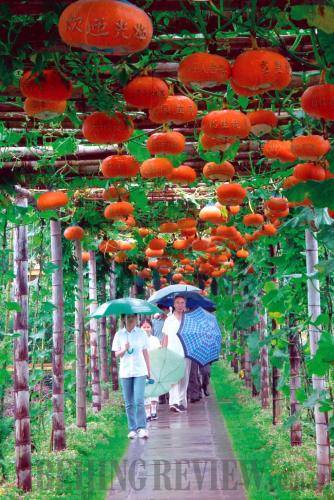|
 |
|
BEAUTIFUL VIEW: Visitors walk along an ecological corridor in Tengtou Village, Zhejiang Province (XINHUA) |
A two-story World Expo 2010 building, still under construction on the south bank of Shanghai's Huangpu River, is garnering a great deal of attention.
The 14-meter high and 1,000-square-meter building is being built to mimic Tengtou Village in Ningbo City, Zhejiang Province. This is the only rural example that will be on display during the 2010 Shanghai World Expo, whose theme is Better City, Better Life. The model will display the unique culture of water towns and interactions between cities and villages.
When visitors step into Tengtou Pavilion, they will not only hear the birds singing and the smell of flowers that are both generated by modern technology, they will also plant ecological crops and pick fruits from trees in open fields on the second floor.
When the Expo ends, the pavilion will be moved to Tengtou Village as a permanent scenic spot for its real namesake. Located 27 km from downtown Ningbo, Tengtou Village was once an infamously poor village.
"Dramatic changes have taken place here since 1965, when the village went all out to develop its agricultural economy," said Fu Qiping, head of the village.
By 1980, hard-working villagers successfully transformed their farmland into orderly high-yield tracts with a regulated irrigation system. During the period of opening up, they also started their first clothing factory. More than 60 enterprises have now been established in the manufacturing, primary and tertiary industries. In 2007, the village's gross domestic product was 513 million yuan ($75 million). It has seen an average growth rate of 17 percent since 1997.
Villagers live in modern villas with electric appliances, cable TV and broadband Internet access. They receive public welfare, including endowment insurance, medical coverage and education funds. Around 15,000 people have been attracted from all over the country to work in Tengtou, though its population is only 817.
"If it was just focusing on economic development, this village would not grow up in such a healthy way," said Fu. "At the very beginning, we attached great importance to environmental protection."
The same time it began working to bolster its economy, Tengtou Village also began a program of environmental protection by combining agriculture with forestry, animal husbandry, fishery, industry and trade. A recycling system of farming, animal husbandry, cultivation, by-product processing and organic fertilizers reduces the amount of chemical fertilizer and pesticides used in the area.
"We believe that beautiful mountains and fresh water are as precious as gold," said Fu. "And we say no to all projects that can cause pollution in the village."
In the mid-1980s, a Japanese businessperson wanted to invest 10 million yuan ($1.47 million) to build a small paper mill in the village. The person was refused due to the possibility of creating significant pollution. At the beginning of the 1990s, an environmental protection committee was set up to monitor investments and adopted a one-vote veto process. Since then, 46 projects that offered both economic benefits and pollution have been rejected.
With its great achievements on both economic and ecological development, the village was recognized on the Global 500 Roll of Honor for Environmental Achievement in 1993 and the World Top 10 Harmonious Villages in 2007.
Its beautiful scenery attracts more and more visitors every year and tourism has developed into an important industry.
"Here you can clearly see fish swimming in the river while you can eat vegetables and fruits totally free of chemical fertilizers," said Fu. "We also hold agriculture-related sports and animal competitions such as pig running to enrich the villagers' spare time."
The United Nations Environment Program considers Tengtou a characteristic Chinese village that combines environment, industrialization, science and technology with innovations in public service, superior conscientiousness in ecology and a strong sense of social responsibility. | 